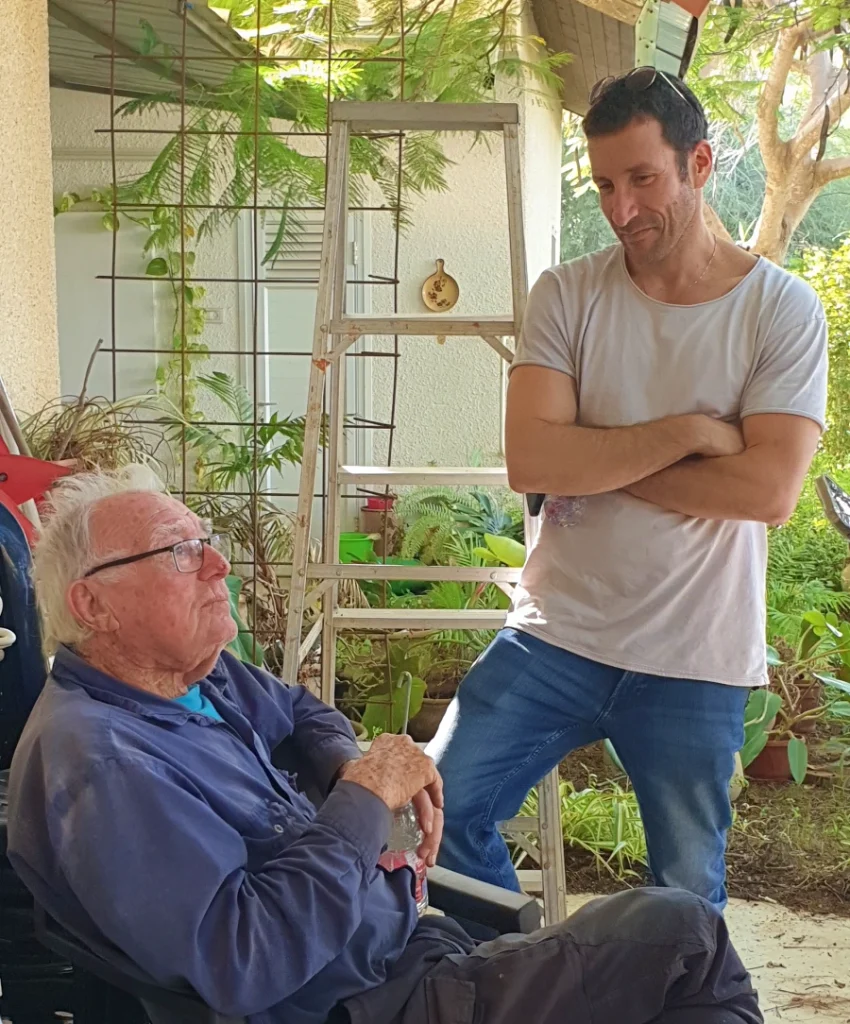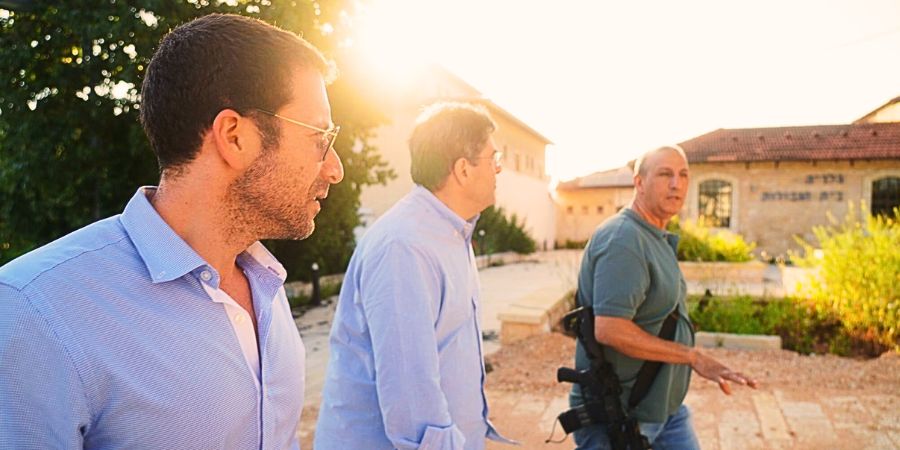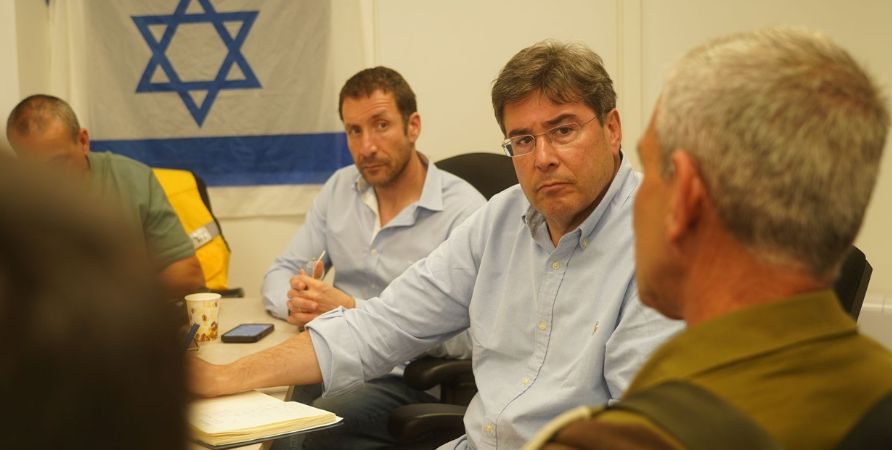The Jewish Federation of New York in Israel announced additional support grants that will be transferred directly to the confrontation line communities in the north: approximately 40 million shekels will be transferred to 39 communities that were evacuated due to the war.
These grants join more than 20 million shekels that the Jewish philanthropic organization has already transferred, in the first month of the war – to support all the authorities on the northern border, in medical centers and in civil society organizations operating in cities that absorbed tens of thousands of evacuees throughout the country.
Since October 7th, the organization has invested a cumulative amount of approximately 315 million shekels (about 85 million dollars), in 260 local authorities, hospitals, organizations and various associations – engaged in the treatment, support and rehabilitation of hundreds of thousands of Israelis. Approximately 700 million shekels (about 190 million dollars) were raised during the first days of the war in order to meet the emergency needs of the state – this of course alongside the ongoing activity of the Federation in Israel.
Half a Billion – Within a Month
The UJA-Federation of New York is in fact the largest philanthropic community organization in the world, which was established more than 100 years ago and has been supporting Israel since its establishment. The person who heads the organization in Israel is former Knesset member Itzik Shmuli, who recently served as Minister of Labor, Welfare and Social Services – and today serves as the director general of the federation in Israel.

“This organization is umbilically connected to the establishment of the State of Israel, to building the institutions, the army, the security, and Israeli society,” he says. “So cumulatively over decades of support, we are talking about an investment of tens of billions of dollars in Israel – if not more. Every time a shocking event happens in the country – wars, intifadas, economic crises, waves of immigration – this federation with all its power, which includes between 70 to 80 thousand donors, shows up and stands behind the State of Israel. Especially after October 7th, which is a defining event in the history of the state.”
Further proof of the unconditional support Shmuli speaks of was received on that dramatic and traumatic day itself. During that difficult day, the Federation, led by Chairman Marc Rowan, President Linda Mirels, and CEO Eric Goldstein, launched a rapid emergency fundraising campaign. Within just one month, an unprecedented amount of about half a billion shekels was raised. “Already on that day, every possible record of fundraising, involvement or support was broken,” says Shmuli. “It was simply amazing to see this community rallying and providing a lot of resources to support the State of Israel in its fateful and difficult hour.”
From his point of view, the involvement and support from members of the Federation community had a critical value – precisely in light of the government’s inaction and incompetence. “It took them a very long time to react and enter the picture,” Shmuli testifies. “So it is definitely possible to say that the failure that met us on the security side quickly rolled over to the civilian side as well. In some areas in the north, to this day, the government simply does not exist. This is reflected in a significant lack of response to the citizen, in informal education, in a population that needs treatment for trauma, in protection and readiness for war. The frontline hospitals in the periphery are partially protected and the supply of everything they need to operate a protected and prepared hospital for a war event is insufficient. In the first days of the war there were absolutely crazy protection gaps there,” he illustrates. “And into all this lack, which is at the core of the government’s responsibility, philanthropy entered and rallied with full force to provide a response to all these challenges – especially in the first period of the war.”
Historic Support for Israel
The close activity and support of the New York Federation in Israel began from the very first days of the state with investment and support in what it identifies as “Israel’s internal challenges”, as Shmuli describes: “This is an investment in substantial and strategic issues such as strengthening Israeli democracy, dealing with social rifts, economic gaps – also in encouraging religious pluralism in society and diversity in Jewish identity, an area in which Israel is considered very conservative and centralized.”
“Fortunately, the Federation is strong enough that even when an emergency occurs, we do not stop our investments in what we have identified as one of the great strategic challenges of Israeli society. We understand that the day after – these challenges are here to stay. Alongside the very significant rallying of the Federation to respond to Israel’s emergency needs, we continue to invest in other areas as well,” he emphasizes. “But there is no doubt that today most of our efforts and resources are directed to provide a response to Israel’s most urgent needs – and that is what we have been doing mainly since October 7th.”
In which of your prominent initiatives is this reflected?
“In all the evacuation centers – Eilat, Tiberias and the Dead Sea – we supported dozens of organizations, in education, trauma treatment, frameworks for the elderly, communities struggling to stay together after people were murdered and abducted, support for authorities in the south and also in communities. Because it took the government a long time to enter – we joined together with the business forum and the forum of the 150 leading companies in the economy. Together we support 15 communities in 4 main areas: resilience, trauma, education and employment. We receive the needs of the communities and their prioritization and provide a response to these needs in the next 8 to 12 months. These are tremendous resources being invested here with the understanding that if we do not provide a response to these communities now, some of them will not withstand.”

“In addition, we support special populations, people from Magen David Adom and ZAKA organizations who still carry heavy psychological scars. We are there to help and support them mentally and also physically – to replenish the organizations’ supplies and treat the people. We support the families of reserve soldiers and Nova victims, with special complexes that have been set up all over the country to provide a response to the survivors and their families. We also support the families of the abductees with an emergency fund intended to provide a response to the needs of families who have been uprooted from their lives – this is another huge government vacuum that we have entered and we are there to support the most urgent needs.”
Alongside an important investment in the southern communities and settlements that suffered the most severe damage as a result of the events of October 7th, a strategic decision was made in the organization under Shmuli’s management to invest in the urgent needs of the people of the north. “Today we are the most significant philanthropic player there. We have approved significant emergency grants to dozens of localities, authorities and communities along the entire confrontation line – from the Golan to Nahariya – to increase their readiness and protection. We also gave very large grants to the frontline hospitals so they could function in an emergency and increase their occupancy if and when we roll into a war in the north.”
You are actually describing here a huge operation that parallels the activity of a government ministry.
“Absolutely. We are in the field all day. All day. In the Dead Sea, in Eilat, in all the confrontation line communities – Metula, Hurfeish, Fassuta. To this day, we operate in the north where the government simply does not exist – every mayor in the north will tell you that. Take Kiryat Shmona for example, a city whose residents are scattered in about 200 places across the country, and ask Avichai Stern (the mayor of Kiryat Shmona – I.Z.) – he will tell you that the New York Federation was the first to stand up to help and to this day has given more money than the government. Go from city to city and you will hear exactly the same tune.”
“On the one hand, it is something I am very proud of. The fact that this organization manages to provide answers and solutions to a great many Israelis who have had the ground pulled out from under their feet – and you say to yourself, this is what I’m here for, this is why I get up in the morning. On the other hand, I am a person who believes in the state – and something in me completely breaks when I see the inaction and incompetence. To be fair, it must be said that as time goes by, the government enters the picture and in some areas manages to provide a response – but the gaps are still very large.”
What about the ‘day after‘?
“The October 7th pogrom redefined not only our national history, but also sharpens our shared sense of mission. The State of Israel was established as a promise to Auschwitz and the Farhud, so that Jews would no longer have to hide in the attic from slaughter. And on October 7th, this fundamental promise was broken in a shocking failure. For the first time in our generation, we understand that sovereignty is not guaranteed merely by virtue of historical imperative, but that it is a daily burden that we must bear. I can say that we, as the largest philanthropic-community organization in the world, will continue to be there the day after as well to assist in the rehabilitation efforts. Millions of Israelis who have gone out of their way in recent months to support emergency needs have laid the foundations and the founding ethos, upon which, I am sure, we will be able to embark on a new path.”
The very significant and long-standing activity of the Federation here, especially since October 7th, is another cast-iron illustration of the Gordian knot between Israel and the United States.
“Without a doubt. Israel’s military power is the fundamental building block of our existence, but alongside it must come political wisdom and regional cooperation which are essential as a matter of national security. In this context, every Israeli understands, especially after the last week, how deep and vital the alliance with the United States is as an existential matter. And despite all the nonsense and ingratitude – President Biden always stands by Israel’s side like no president before him – and proves his love and deep concern for Israel in an inspiring way. This is reflected not only in aircraft carriers and weaponry, but also in diplomatic protection and a coalition of countries that is the most important Iron Dome that Israel could have dreamed of. Disagreements are allowed – but they need to be resolved inside the room and not by poking a finger in the eye of your closest partner.”





